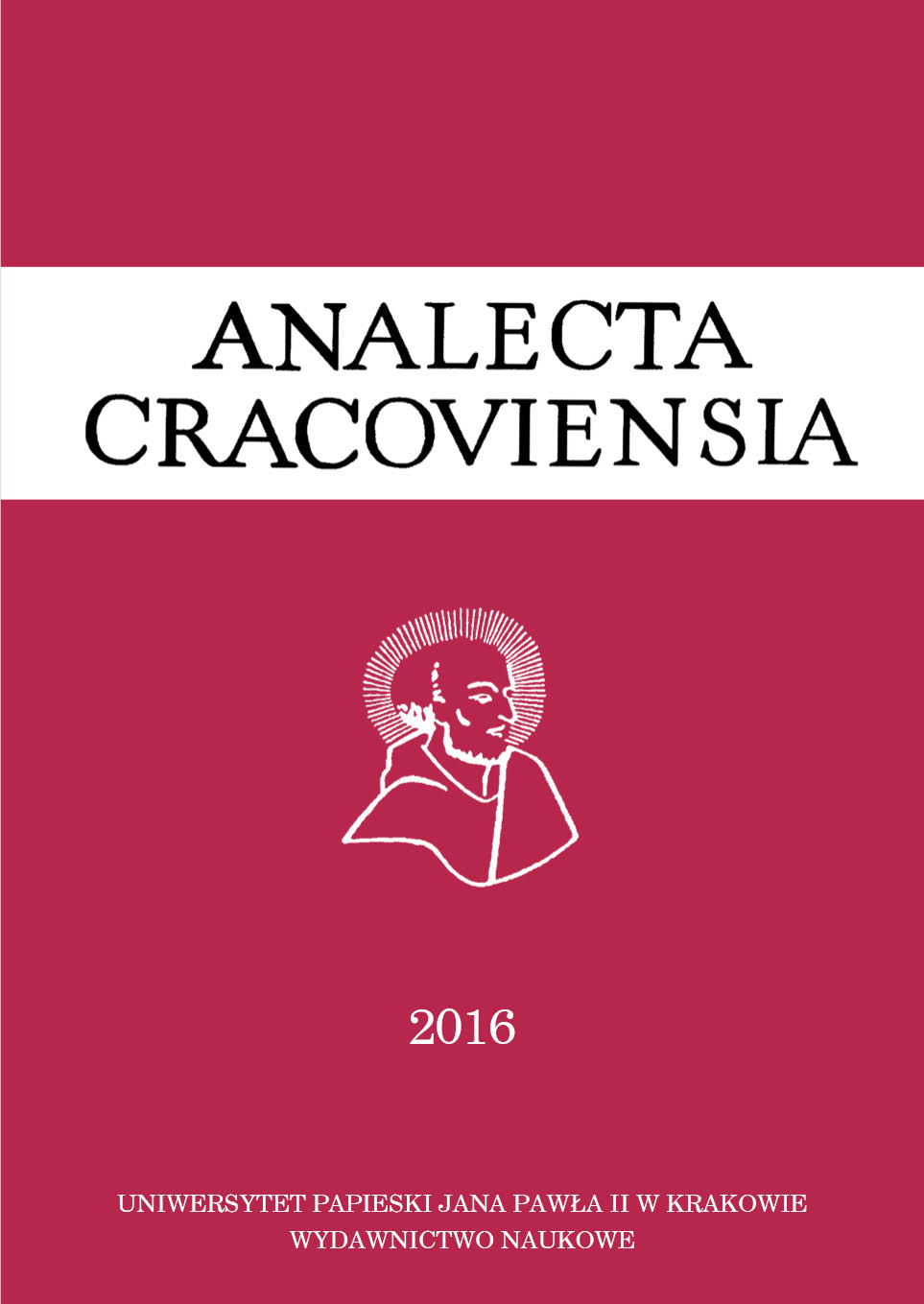Błogosławiony Jan Duns Szkot o możliwości przyjęcia komunii świętej w stanie grzechu śmiertelnego. Analiza w kontekście współczesnych dyskusji teologiczno-dyscyplinarnych
DOI:
https://doi.org/10.15633/acr.2020Słowa kluczowe:
komunia święta, bł. Jan Duns Szkot, sakrament pojednania, dyscyplina sakramentalna, związki niesakramentalneAbstrakt
Dyskusja w Kościele nad dopuszczeniem osób rozwiedzionych, żyjących w powtórnych związkach do komunii świętej jest częścią szerszej debaty nad możliwością przyjmowania komunii w grzechu śmiertelnym. Na ten temat wypowiadali się teologowie w różnych wiekach. Genialny franciszkański teolog bł. Jan Duns Szkot rozumie takie działanie jako następny grzech śmiertelny. Jednocześnie respektuje osąd dokonany przez prawe sumienie, czy taki grzech przed przyjęciem komunii miał miejsce. Pozwala on także na przyjęcie komunii w celu uniknięcia zgorszenia wiernych, pod warunkiem mocnego postanowienia wyznania grzechu w sakramencie pojednania tak szybko, jak będzie to możliwe. Ten wyjątek nie dotyczy wiernych, którzy nie mają mocnego postanowienia zerwania z grzechem. Autor artykułu wskazuje, że dopuszczenie do przyjmowania komunii osób w takim stanie będzie szkodą dla ich życia duchowego i przyczyni się do większej utraty poczucia grzechu wśród współczesnych katolików.Bibliografia
Augustyn, Homilie na Ewangelie i Pierwszy List św. Jana, t. 1, przeł. W. Szołdrski, W. Kania, Warszawa 1977.
Concilium Toletanum XII, [w:] Collectio maxima conciliorum omnium Hispaniae et novi orbis, epistolarumque decretalium celebriorum necnon plurium monu-
mentorum veterum ad illam spectantium, vol. 4, eds. J. Sáenz de Aguirre, G. Catalani, Romae 1755, s. 262–278.
Franciszek, Adhortacja apostolska Amoris laetitia. O miłości w rodzinie, 19 marca 2016, Częstochowa 2016.
Gennadius Scholasticus, De Ecclesiasticis dogmatibus, [w:] Patrologiae Cursus Completus. Series Latina, vol. 58, ed. J. P. Migne, Parisiis 1862, k. 979–1000.
Gratianus, Dekretum Gratiani. Patrologiae Cursus Completus. Series Latina, vol. 187, ed. J. P. Migne, Parisiis 1855.
Jan Duns Szkot, Ordinatio, Civitas Vaticana 2010, lb. IV, dist. 9, q. 1, 5 (Opera omnia, vol. 12).
Joannes Paulus PP. II, Adhortatio apostolica Familiaris consortio de Familiae Christianae muneribus in mundo huius temporis, 22 listopada 1981, AAS 74 (1982), s. 81–191; tekst polski: Jan Paweł II, Adhortacja apostolska Familiaris consortio, Wrocław
Joannes Paulus PP. II, Adhortatio apostolica Reconciliatio et paenitentia de reconciliatione et paenitentia in hodierno Ecclesiae munere, 2 grudnia 1984, AAS 77 (1985), s. 185–275; tekst polski: Jan Paweł II, Adhortacja apostolska Reconciliatio et paenitentia, Wrocław 1999.
Joannes Paulus PP. II, Litterae encyclicae Veritatis splendor de quibusdam quaestionibus fundamentalibus doctrinae moralis Ecclesiae, 6 sierpnia 1993, AAS 85 (1993), s. 1133–1228; tekst polski: Jan Paweł II, Encyklika Veritatis splendor, Wrocław 1994.
Kaczyński E., Prawda, dobro, sumienie. Z zagadnień teologii moralnej, Warszawa 2007.
Katechizm Kościoła katolickiego, Poznań 2002.
Kodeks prawa kanonicznego, Poznań 1984.
Kongregacja Nauki Wiary, Instrukcja o powołaniu teologa w Kościele Donum veritatis, [w:] W trosce o pełnię wiary. Dokumenty Kongregacji Nauki Wiary, t. 1, red. J. Królikowski, Z. Zimowski, Tarnów 1995, s. 353–369.
Kongregacja Nauki Wiary, List do biskupów Kościoła katolickiego na temat przyjmowania komunii św. przez wiernych rozwiedzionych żyjących w nowych związkach (14 września 1994), „L’Osservatore Romano” (wyd. polskie) 163 (1994) nr 11,
s. 49–51.
Międzynarodowa Komisja Teologiczna, Teologia dzisiaj. Perspektywy, zasady i kryteria, Kraków 2012.
Petrus Lombardus, Libri IV sententiarum, vol. 2, Florentia 1916.
Raymundus de Pennaforte, Decretales D. Gregorii Papae IX. Suae integritati vna cum glossis restitutae, Romae 1582.
Sobór Laterański IV, Konstytucja Omnis utriusque sexus, [w:] Dokumenty soborów powszechnych, t. 2, red. A. Baron, H. Pietras, Kraków 2007, s. 258–261.
Sobór Trydencki, Nauka o świętych sakramentach pokuty i ostatniego namaszczenia, [w:] Dokumenty soborów powszechnych, t. 4, red. A. Baron, H. Pietras, Kraków 2004, s. 483–513.
Tomasz z Akwinu, Suma teologiczna. Eucharystia, t. 28, przeł. S. Piotrowicz, Londyn 1974.
Williams T., Introduction. The Life and Works of John Duns the Scot, [w:] The Cambridge Companion to Duns Scotus, ed. T. Williams, Cambridge 2003, s. 1–14.
Pobrania
Opublikowane
Numer
Dział
Licencja
Obecnie autorzy publikujący w czasopiśmie udzielają jego wydawcy zgody o następującej treści:
- Autor zachowuje autorskie prawa majątkowe do utworu, a jednocześnie udziela wydawcy czasopisma zgody na jego pierwszą publikację w wersji drukowanej i wersji online na licencji Creative Commons Uznanie autorstwa 4.0 Międzynarodowe oraz zgody na wykonywanie opracowań, w tym przekładów.
- Autor ma możliwość udzielania zgody niewyłącznej na opublikowanie utworu w wersji, która ukazała się w czasopiśmie (np. zamieszczenia go w repozytorium instytucjonalnym lub opublikowania w książce), wraz z informacją o jego pierwszej publikacji w czasopiśmie.
- Autor może umieścić swój utwór online (np. w repozytorium instytucjonalnym lub na swojej stronie internetowej) jeszcze przed zgłoszeniem utworu do czasopisma.

